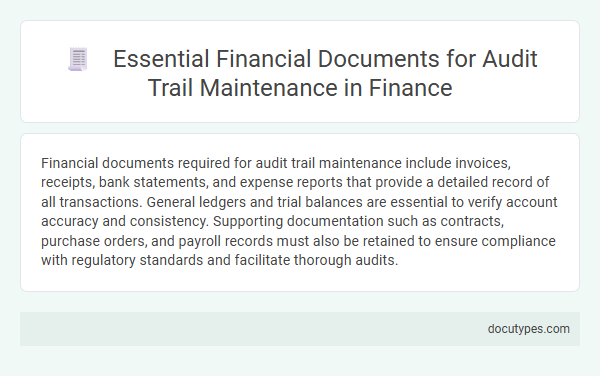Financial documents required for audit trail maintenance include invoices, receipts, bank statements, and expense reports that provide a detailed record of all transactions. General ledgers and trial balances are essential to verify account accuracy and consistency. Supporting documentation such as contracts, purchase orders, and payroll records must also be retained to ensure compliance with regulatory standards and facilitate thorough audits.
Introduction to Financial Audit Trail Maintenance
| Introduction to Financial Audit Trail Maintenance | |
|---|---|
| Definition | Financial audit trail maintenance refers to the systematic documentation and organization of financial transactions and records that support accounting entries and reports. |
| Purpose | Ensures transparency, accuracy, and accountability in financial reporting by providing a verifiable path of transactions. |
| Key Financial Documents Required | |
| General Ledger | Comprehensive record of all financial transactions; fundamental for tracing transaction history. |
| Invoices | Evidence of goods or services provided, detailing amounts due and payment terms. |
| Receipts | Proof of payment receipts and cash inflows to validate transaction completion. |
| Bank Statements | Records of actual cash movements documented by financial institutions to cross-verify accounting entries. |
| Expense Reports | Detailed accounts of business expenses, helping to justify financial outflows. |
| Contracts and Agreements | Legal documents supporting the terms, conditions, and existence of financial obligations. |
| Payroll Records | Documentation of employee compensation, taxes, and benefits linked to financial transactions. |
| Tax Filings | Official submission records validating tax liabilities, refunds, and compliance status. |
| Audit Reports | External or internal evaluations summarizing financial health and adherence to regulations. |
| Importance for Your Business | |
| Maintaining these documents creates a reliable audit trail essential for regulatory compliance, fraud detection, and accurate financial analysis. | |
Importance of Proper Financial Documentation
Proper financial documentation is essential for maintaining an accurate audit trail. It ensures transparency, accountability, and regulatory compliance in financial operations.
Key financial documents required for audit trail maintenance include invoices, receipts, bank statements, and payroll records. These documents provide verifiable evidence of transactions and support financial integrity.
Key Principles of Audit Trail Compliance
Maintaining an effective audit trail in finance requires accurate documentation of all financial transactions and supporting evidence. Compliance with audit trail standards ensures transparency, accountability, and regulatory adherence.
- Transaction Records - Detailed logs of all financial transactions including dates, amounts, and parties involved ensure traceability.
- Supporting Documentation - Invoices, receipts, contracts, and approval forms validate the authenticity of each transaction.
- Access Logs - Records of user access to financial systems help monitor data integrity and prevent unauthorized alterations.
Primary Financial Statements Required
Primary financial statements are essential for maintaining a robust audit trail. These include the Balance Sheet, Income Statement, and Cash Flow Statement, which collectively provide a comprehensive view of a company's financial health.
Supporting these are the Statement of Changes in Equity and Notes to the Financial Statements, which offer detailed insights and explanations. You must ensure these documents are accurately prepared and securely stored to facilitate effective audit trail maintenance.
Supporting Documents for Financial Transactions
What financial documents are essential for maintaining a proper audit trail? Supporting documents for financial transactions include invoices, receipts, bank statements, and purchase orders. These documents provide evidence of each transaction, ensuring transparency and accuracy in financial reporting.
Invoices and Receipts Management
Invoices and receipts are essential financial documents required for effective audit trail maintenance. Maintaining accurate invoices ensures that all sales and purchases are properly recorded, while receipts provide proof of payment and transaction authenticity. You must organize and preserve these documents systematically to comply with financial regulations and support transparent accounting practices.
Payroll and Employee Expense Records
Maintaining an audit trail in finance requires accurate payroll and employee expense records. These documents ensure transparency and compliance with regulatory standards.
Payroll records must include timesheets, salary slips, tax withholdings, and benefit deductions to verify employee compensation accurately. Employee expense reports need receipts, approval forms, and reimbursement details to track legitimate business expenditures. Together, these documents support a reliable audit trail by providing clear evidence of financial transactions related to personnel costs.
Bank Statements and Reconciliation Reports
Maintaining a comprehensive audit trail requires specific financial documents to ensure accuracy and compliance. Bank statements and reconciliation reports are essential components that validate transaction records and financial integrity.
- Bank Statements - Official monthly records from financial institutions detailing all transactions within an account.
- Reconciliation Reports - Detailed comparisons between bank statements and company records to identify discrepancies.
- Transaction Logs - Chronological records supporting the entries in bank statements and reconciliation reports.
Tax Records and Regulatory Filings
Maintaining a detailed audit trail requires careful preservation of financial documents that verify compliance and accuracy. Tax records and regulatory filings play a critical role in ensuring transparency and accountability during an audit process.
- Tax Returns - These documents provide detailed information about income, deductions, and tax liabilities filed with tax authorities.
- Payroll Records - Records of employee compensation and related tax withholdings demonstrate proper tax compliance and salary payments.
- Regulatory Filings - Reports and statements submitted to government agencies confirm adherence to legal and financial regulations.
Organizing these financial documents systematically supports effective audit trail maintenance and compliance verification.
What Financial Documents Are Required for Audit Trail Maintenance? Infographic

